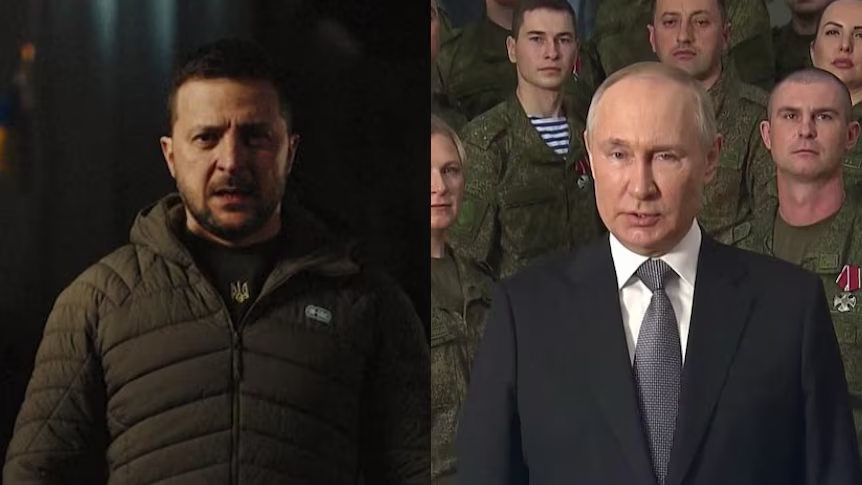In a landmark announcement, Russian President Vladimir Putin has expressed a readiness to negotiate a resolution to the ongoing conflict in Ukraine. Speaking at his annual press conference on December 19, 2024, Putin articulated Russia’s openness to “negotiations and compromises,” while indicating his willingness to engage directly with U.S. President-elect Donald Trump to discuss potential solutions. The statement has drawn global attention, marking a possible turning point in a war that has caused widespread devastation since its outbreak in early 2022.
A Shift in Russia’s Approach
Putin’s remarks signal a notable departure from his government’s earlier positions, which often included stringent preconditions for any discussions. “We have always said that we are ready for negotiations and compromises,” Putin declared, emphasizing that there are no longer prerequisites for talks with Ukraine. This pivot in tone suggests that Moscow may be seeking new avenues to end the protracted conflict, possibly driven by the strain of international sanctions and military setbacks on the battlefield.
The Russian President’s openness to involving President-elect Trump introduces a fresh dimension to the diplomatic equation. Trump, who has previously voiced his intent to broker peace between Russia and Ukraine, has yet to outline a specific framework for such discussions. Nevertheless, Putin’s acknowledgment of Trump’s potential role underscores the Kremlin’s hope that the incoming U.S. administration could bring a new approach to the crisis, distinct from the hardline stance taken by President Joe Biden’s administration.
Background of the Conflict
The war in Ukraine began with Russia’s full-scale invasion in February 2022, a move that Moscow justified as necessary to protect Russian-speaking populations in eastern Ukraine and to counter NATO’s eastward expansion. The conflict, however, has been widely condemned as an unprovoked act of aggression, leading to extensive sanctions on Russia and its near-total isolation on the international stage.
Despite these punitive measures, the war has dragged on, with heavy casualties and significant displacement of civilians. Russian forces have faced stiff resistance from Ukrainian troops, who have been bolstered by Western military aid. The result has been a grueling stalemate, with neither side achieving a decisive breakthrough.
Opportunities and Skepticism
Putin’s statement of willingness to compromise has sparked cautious optimism among some international observers. European leaders, in particular, view the potential for U.S.-mediated talks as a chance to de-escalate the conflict and avert further humanitarian disasters. However, many remain wary of Russia’s intentions.
Historically, Moscow’s proposals for negotiations have been viewed with skepticism, often seen as tactics to buy time or consolidate territorial gains. Analysts warn that any talks must be approached with caution to ensure that Ukraine’s sovereignty and territorial integrity are not compromised. “We must remember that negotiations are only meaningful if they lead to a fair and sustainable peace,” said one European diplomat.
Ukraine, for its part, has maintained a firm stance on the conditions for peace. President Volodymyr Zelenskyy has repeatedly stated that any resolution must include the full withdrawal of Russian forces from occupied territories, including Crimea and parts of the Donetsk and Luhansk regions. Kyiv remains deeply concerned that a premature agreement could result in a “frozen conflict,” leaving Russian-controlled enclaves within Ukraine’s borders.
The Role of Trump’s Presidency
President-elect Trump’s approach to the Ukraine conflict will likely be one of the earliest tests of his foreign policy. Known for his unconventional diplomacy and emphasis on deal-making, Trump has signaled a desire to improve relations with Russia in the past. However, his potential engagement with Putin on this issue is likely to draw scrutiny from both domestic and international audiences.
Critics fear that Trump may prioritize a swift resolution over a just one, potentially compromising Ukraine’s position. Supporters, however, argue that his fresh perspective could break the current deadlock and pave the way for a negotiated settlement. As Trump prepares to take office, the world will be watching closely to see how he navigates this delicate situation.

International Reactions
The global reaction to Putin’s statement has been mixed. In Europe, there is cautious hope that talks involving the U.S. could lead to a breakthrough. French President Emmanuel Macron and German Chancellor Olaf Scholz have both indicated support for a negotiated resolution, provided that it respects international law and Ukraine’s territorial sovereignty.
Conversely, some nations, particularly in Eastern Europe, have voiced concerns that negotiations could embolden Russia by rewarding its aggression. Poland and the Baltic states, for example, have urged NATO to maintain its strong stance against Moscow, warning against any concessions that could undermine regional security.
Read More:
https://thefirstcritic.com/blog/ugc-proposes-guidelines-for-skill-based-courses-in-higher-education/
In the United States, the announcement has reignited debates over the role of American diplomacy in resolving the Ukraine crisis. While some lawmakers view potential talks as an opportunity for peace, others argue that engaging with Putin could undermine the principles of accountability and justice for the invasion.
The Path Forward
As the international community digests Putin’s remarks, the path forward remains uncertain. For any talks to succeed, they must address not only the immediate cessation of hostilities but also the underlying issues that led to the conflict. This includes the status of Crimea, the future of Russian-controlled territories in eastern Ukraine, and the broader question of NATO’s role in Eastern Europe.
The coming months will be critical in determining whether Putin’s overture leads to meaningful progress or is merely a strategic ploy. For Ukraine, the stakes could not be higher. Any resolution must ensure the nation’s sovereignty and security, while avoiding the pitfalls of a frozen conflict.
As the world waits for the Trump administration’s response, one thing is clear: the Ukraine conflict remains one of the most pressing challenges of our time, with implications that extend far beyond the region. Whether this latest development marks the beginning of the end or just another chapter in a long and painful saga will depend on the actions of leaders on all sides.

